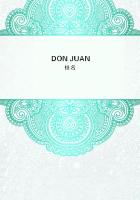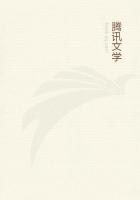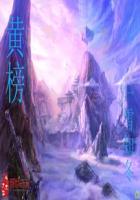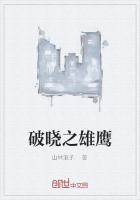But when shellac, sulphur, or spermaceti was interposed between the two spheres of one jar, while air occupied this interval in the other, then he found that the instrument occupied by the 'solid dielectric' takes more than half the original charge. A portion of the charge was absorbed by the dielectric itself. The electricity took time to penetrate the dielectric. Immediately after the discharge of the apparatus, no trace of electricity was found upon its knob. But after a time electricity was found there, the charge having gradually returned from the dielectric in which it had been lodged. Different insulators possess this power of permitting the charge to enter them in different degrees. Faraday figured their particles as polarized, and he concluded that the force of induction is propagated from particle to particle of the dielectric from the inner sphere to the outer one. This power of propagation possessed by insulators he called their 'Specific Inductive Capacity.'
Faraday visualizes with the utmost clearness the state of his contiguous particles; one after another they become charged, each succeeding particle depending for its charge upon its predecessor.
And now he seeks to break down the wall of partition between conductors and insulators. 'Can we not,' he says, 'by a gradual chain of association carry up discharge from its occurrence in air through spermaceti and water, to solutions, and then on to chlorides, oxides, and metals, without any essential change in its character?'
Even copper, he urges, offers a resistance to the transmission of electricity. The action of its particles differs from those of an insulator only in degree. They are charged like the particles of the insulator, but they discharge with greater ease and rapidity; and this rapidity of molecular discharge is what we call conduction.
Conduction then is always preceded by atomic induction; and when, through some quality of the body which Faraday does not define, the atomic discharge is rendered slow and difficult, conduction passes into insulation.
Though they are often obscure, a fine vein of philosophic thought runs through those investigations. The mind of the philosopher dwells amid those agencies which underlie the visible phenomena of Induction and Conduction; and he tries by the strong light of his imagination to see the very molecules of his dielectrics. It would, however, be easy to criticise these researches, easy to show the looseness, and sometimes the inaccuracy, of the phraseology employed; but this critical spirit will get little good out of Faraday. Rather let those who ponder his works seek to realise the object he set before him, not permitting his occasional vagueness to interfere with their appreciation of his speculations. We may see the ripples, and eddies, and vortices of a flowing stream, without being able to resolve all these motions into their constituent elements; and so it sometimes strikes me that Faraday clearly saw the play of fluids and ethers and atoms, though his previous training did not enable him to resolve what he saw into its constituents, or describe it in a manner satisfactory to a mind versed in mechanics. And then again occur, I confess, dark sayings, difficult to be understood, which disturb my confidence in this conclusion. It must, however, always be remembered that he works at the very boundaries of our knowledge, and that his mind habitually dwells in the 'boundless contiguity of shade' by which that knowledge is surrounded.
In the researches now under review the ratio of speculation and reasoning to experiment is far higher than in any of Faraday's previous works. Amid much that is entangled and dark we have flashes of wondrous insight and utterances which seem less the product of reasoning than of revelation. I will confine myself here to one example of this divining power. By his most ingenious device of a rapidly rotating mirror, Wheatstone had proved that electricity required time to pass through a wire, the current reaching the middle of the wire later than its two ends. 'If,' says Faraday, 'the two ends of the wire in Professor Wheatstone's experiments were immediately connected with two large insulated metallic surfaces exposed to the air, so that the primary act of induction, after making the contact for discharge, might be in part removed from the internal portion of the wire at the first instance, and disposed for the moment on its surface jointly with the air and surrounding conductors, then I venture to anticipate that the middle spark would be more retarded than before. And if those two plates were the inner and outer coatings of a large jar or Leyden battery, then the retardation of the spark would be much greater.' This was only a prediction, for the experiment was not made. Sixteen years subsequently, however, the proper conditions came into play, and Faraday was able to show that the observations of Werner Siemens, and Latimer Clark, on subterraneous and submarine wires were illustrations, on a grand scale, of the principle which he had enunciated in 1838. The wires and the surrounding water act as a Leyden jar, and the retardation of the current predicted by Faraday manifests itself in every message sent by such cables.
The meaning of Faraday in these memoirs on Induction and Conduction is, as I have said, by no means always clear; and the difficulty will be most felt by those who are best trained in ordinary theoretic conceptions. He does not know the reader's needs, and he therefore does not meet them. For instance he speaks over and over again of the impossibility of charging a body with one electricity, though the impossibility is by no means evident. The key to the difficulty is this. He looks upon every insulated conductor as the inner coating of a Leyden jar. An insulated sphere in the middle of a room is to his mind such a coating; the walls are the outer coating, while the air between both is the insulator, across which the charge acts by induction. Without this reaction of the walls upon the sphere you could no more, according to Faraday, charge it with electricity than you could charge a Leyden jar, if its outer coating were removed. Distance with him is immaterial. His strength as a generalizer enables him to dissolve the idea of magnitude; and if you abolish the walls of the room--even the earth itself--he would make the sun and planets the outer coating of his jar. I dare not contend that Faraday in these memoirs made all his theoretic positions good. But a pure vein of philosophy runs through these writings; while his experiments and reasonings on the forms and phenomena of electrical discharge are of imperishable importance.



